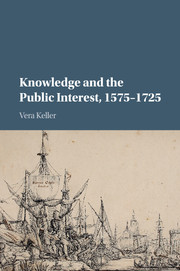Crossref Citations
This Book has been
cited by the following publications. This list is generated based on data provided by Crossref.
2016.
Current Bibliography of the History of Science and Its Cultural Influences, 2016.
Isis,
Vol. 107,
Issue. S1,
p.
i.
Keller, Vera
2016.
Francis Bacon on Motion and Power.
Vol. 218,
Issue. ,
p.
249.
Giglioni, Guido
2016.
Francis Bacon on Motion and Power.
Vol. 218,
Issue. ,
p.
1.
Keller, Vera
2017.
Storied Objects, Scientific Objects, and Renaissance Experiment: The Case of Malleable Glass.
Renaissance Quarterly,
Vol. 70,
Issue. 2,
p.
594.
CSISZAR, ALEX
2017.
How lives became lists and scientific papers became data: cataloguing authorship during the nineteenth century.
The British Journal for the History of Science,
Vol. 50,
Issue. 1,
p.
23.
Kera, Denisa
2017.
Science Artisans and Open Science Hardware.
Bulletin of Science, Technology & Society,
Vol. 37,
Issue. 2,
p.
97.
Rössner, Philipp Robinson
2018.
Historia magistra vitae – ad acta oder ad nauseam?.
Zeitschrift für Historische Forschung,
Vol. 45,
Issue. 4,
p.
651.
Davis, Robert A.
2018.
Educational Research: Ethics, Social Justice, and Funding Dynamics.
p.
191.
Rublack, Ulinka
2019.
The Right to Dress.
p.
37.
Schüßler, Lotte
2019.
Curating Exhibitions, Ordering Disciplines: Theater Studies and Musicology in the Vienna Rotunda, 1892.
History of Humanities,
Vol. 4,
Issue. 2,
p.
423.
Rublack, Ulinka
and
Riello, Giorgio
2019.
The Right to Dress.
p.
1.
Hamlin, Hannibal
2019.
Technology and the Humanities in Early Modern Studies.
The Sixteenth Century Journal,
Vol. 50,
Issue. 1,
p.
314.
MOXHAM, NOAH
2019.
Natural Knowledge, Inc.: the Royal Society as a metropolitan corporation.
The British Journal for the History of Science,
Vol. 52,
Issue. 2,
p.
249.
Spary, E. C.
2020.
Publishing virtue: Medical entrepreneurship and reputation in the Republic of Letters.
Centaurus,
Vol. 62,
Issue. 3,
p.
498.
Keller, Vera
2020.
Economies of Literature and Knowledge in Early Modern Europe.
p.
51.
Jalobeanu, Dana
2020.
Enacting recipes:GiovanBattistaDellaPorta andFrancisBacon on technologies, experiments, and processes of nature.
Centaurus,
Vol. 62,
Issue. 3,
p.
425.
Siddique, Asheesh Kapur
2020.
Governance through Documents: The Board of Trade, Its Archive, and the Imperial Constitution of the Eighteenth-Century British Atlantic World.
Journal of British Studies,
Vol. 59,
Issue. 2,
p.
264.
Sacco, Francesco G.
2020.
Real, Mechanical, Experimental.
Vol. 231,
Issue. ,
p.
185.
Schober, Sarah-Maria
2020.
Zibet und Zeit.
Zeitschrift für Historische Forschung,
Vol. 47,
Issue. 1,
p.
41.
Swiggers, Pierre
Thomas, Werner
and
Van Hal, Toon
2021.
Missionary Linguistics VI.
Vol. 130,
Issue. ,
p.
265.



